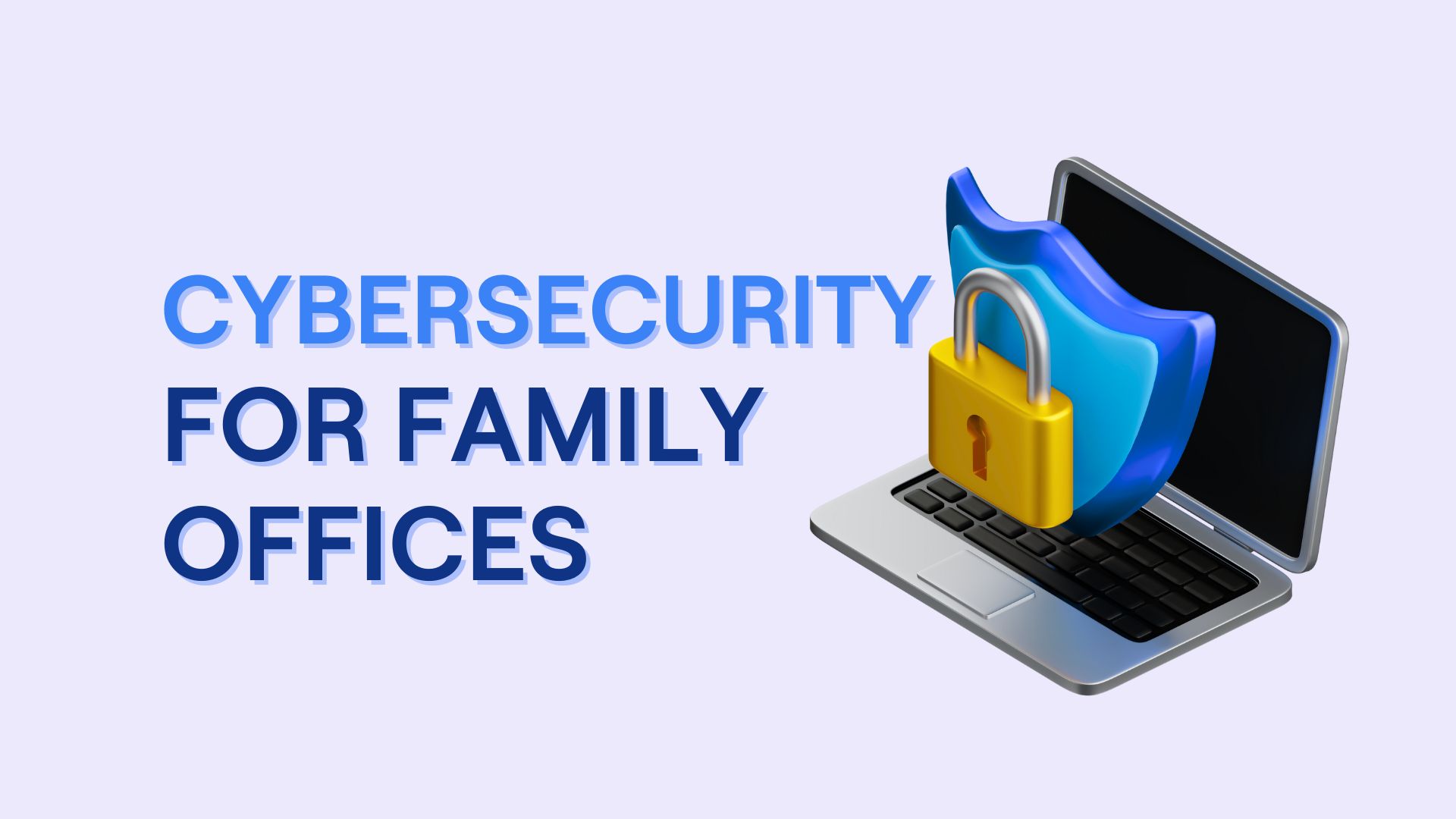Automate your family office
Schedule DemoHeading 1
Heading 2
Heading 3
Heading 4
Heading 5
Heading 6
Lorem ipsum dolor sit amet, consectetur adipiscing elit, sed do eiusmod tempor incididunt ut labore et dolore magna aliqua. Ut enim ad minim veniam, quis nostrud exercitation ullamco laboris nisi ut aliquip ex ea commodo consequat. Duis aute irure dolor in reprehenderit in voluptate velit esse cillum dolore eu fugiat nulla pariatur.
Block quote
Ordered list
- Item 1
- Item 2
- Item 3
Unordered list
- Item A
- Item B
- Item C
Bold text
Emphasis
Superscript
Subscript
TL;DR
Family offices are sitting ducks for cybercriminals. While these offices manage billions in assets, most have shockingly weak cybersecurity. This makes wealthy families prime targets for hackers looking to steal sensitive data, demand ransoms, or access valuable assets. This guide covers the real threats facing family offices and practical steps to protect yourself.
Your family office is probably a cybercriminal's dream target.
Think about it. You're managing enormous wealth with a small team that's focused on investments, not IT security. You handle incredibly sensitive information about family, business dealings, and financial strategies. And unlike big banks with their massive security budgets, you're operating lean.
Deloitte research found that less than half of family offices have proper security in place. That's not just concerning-it's dangerous. When hackers can potentially access hundreds of millions in through one successful attack, why wouldn't they target family offices?
The damage goes beyond money. A successful cyberattack can destroy reputations built over generations, expose private family matters, and create chaos that lasts years. For single family offices and multi-family groups alike, a security breach is a financial loss and an existential threat.
Why Family Offices Are Cybercriminals' Favorite Targets
Unlike massive financial institutions that spend millions on cybersecurity teams, most family office groups are running with skeleton crews. Your IT "department" might be one person who also handles other responsibilities. Meanwhile, you're sitting on assets that make corporate treasuries look like petty cash.
Here's what makes family offices such attractive targets for criminals:
- Concentrated wealth, minimal security: One successful breach can grant cybercriminals access to hundreds of millions in assets. That's a much better ROI than targeting hundreds of smaller accounts.
- Valuable personal information: The intimate details family offices handle (from medical records to business relationships to family dynamics) provide additional leverage for sophisticated attacks.
- Limited security awareness: Recent surveys show that less than a third of family offices provide comprehensive security awareness training. That means staff members are essentially walking around with targets on their backs.
The Threats Keeping Security Experts Awake
- Phishing Gets Personal: Forget those obvious "Nigerian prince" emails. Today's phishing attempts are surgical strikes. Criminals research your family, your investments, your social connections. Then they craft emails that look like they came from your investment manager, your lawyer, or even family. One wrong click on a personal device can compromise everything.
- Ransomware Hurts: When ransomware hits a family office, it's not just about encrypted files. It's about paralyzing operations during critical market windows, potentially exposing deeply private family information, and dealing with criminals who understand exactly how much you can afford to pay.
- The Insider Problem: Your biggest risk might be walking through your front door every morning. Whether it's a disgruntled employee, someone with gambling debts, or just a staff member who clicks the wrong link, insider threats are real and devastating.
- Third-Party Issues: Every vendor, every service provider, every connection to your network is a potential entry point. Cyber criminals target your accountants, lawyers, or investment managers because their security might be even weaker than yours.
Building Real Protection
Train Your People (Because They're Your Biggest Risk)
Security training shouldn't be boring PowerPoints that everyone ignores. Make it relevant to family office operations. Show real examples of attacks targeting wealthy families. Run simulated phishing email tests that mirror actual threats you face.
Members of the family need training too. They're often the ultimate targets, and they need to understand that their personal social media posts, travel plans, and public activities can be used against your entire operation.
Authentication That Actually Works
Multi-factor authentication isn't optional anymore. But don't just check a box. Implement it properly across every system that touches sensitive data. Use hardware tokens for high-privilege accounts. Set up access controls based on what people actually need to do their jobs. The intern doesn't need access to the same systems as your CIO. Regular access reviews help catch when permissions get out of hand.
Network Security That Makes Sense
Your network security should assume that bad actors will eventually get inside. Segment critical systems from general business operations. Monitor everything: not just external traffic, but what's happening inside your network too.
Encrypt everything. Data sitting on servers, information traveling between systems, files stored in the cloud. If it's sensitive, it should be encrypted. And have a backup plan that you've actually tested, because you'll need it.
When Things Go Wrong (And They Eventually Will)
Cyber Insurance
Cyber insurance is essential, but don't treat it like a magic bullet. Read the fine print. Understand what's actually covered with your disaster recovery. Many policies exclude exactly the scenarios that family offices face most often.
Work with insurers who understand family office operations and business continuity. Generic business policies won't cut it when you're dealing with reputational damage, family personal liability, and the unique risks that come with managing substantial wealth.
Incident Response That Works
When a data breach happens, you need a plan (with actionable best practices) that your team can execute while under extreme stress. Define clear roles, establish communication protocols, and practice through tabletop exercises.
Your response plan needs to address both the technical side (containing the cybersecurity breach, preserving evidence) and the business side (notifying family members, managing public relations, coordinating with law enforcement).
Managing Vendor Risks
Every third-party provider with access to your systems or data represents a risk. Investment managers, accounting firms, legal counsel-they all need to meet your security standards, not the other way around.Conduct security assessments proportional to the access you're granting. A vendor with read-only access to basic financial data needs different scrutiny than one with administrative access to your core systems.
Technology That Helps
Artificial Intelligence for Good Guys
AI isn't just a buzzword - it's becoming a legitimate tool for identifying threats that traditional security measures miss. AI-powered systems can spot unusual patterns in network traffic, identify suspicious user behavior, and flag potential threats before they become disasters.
But don't expect AI to solve everything. It's a tool that enhances human decision-making, not a replacement for good security practices and trained staff.
Communication and Cloud Security
Your family members expect to communicate securely about sensitive matters. Invest in end-to-end encrypted communication platforms designed for business use, not consumer apps that might be secure enough for personal use but inadequate for family office operations.
Cloud services can actually improve your security posture if implemented correctly. Major cloud providers invest far more in security than any family office could afford to do internally. But the key phrase is "if implemented correctly" - cloud security requires expertise and ongoing attention.
Building a Security Culture That Sticks
Leadership Sets the Tone
Family office cybersecurity starts at the top. If leadership treats security as an IT problem rather than a business priority, that attitude trickles down. Leadership needs to model good security behavior and allocate appropriate resources.
Make security convenient. If your security measures are so cumbersome that people work around them, you've failed. The most secure system is one that people actually use correctly.
Staying Ahead of Evolving Threats
Cybersecurity isn't a project you complete - it's an ongoing process. Threats evolve, your business changes, and your security posture needs to adapt accordingly.
Stay connected with industry groups and information-sharing initiatives. Learning from other family offices' experiences helps you avoid making the same mistakes and implement proven solutions.
Protecting Your Family Office
Family office cybersecurity isn't about buying the most expensive tools or implementing every security measure you read about. It's about understanding your specific risks, implementing practical protections that your team will actually use, and building a culture where security is everyone's responsibility.
The investment in proper cybersecurity protection pays for itself many times over. The cost of comprehensive security measures is nothing compared to the potential losses from a successful cyberattack - not just financial losses, but the damage to family reputation, relationships, and peace of mind that can last for generations.
Your family's wealth represents more than financial assets. It embodies values, relationships, and responsibilities that extend across generations. Protecting that wealth from cyber threats isn't just about technology - it's about preserving what matters most to your family while ensuring that wealth continues to serve its intended purposes for years to come.
FAQs
What makes family offices particularly vulnerable to cyber attacks compared to other financial institutions?
Many family offices face unique vulnerabilities due to their smaller size, limited cybersecurity resources, and concentrated wealth. Unlike large financial institutions with dedicated cybersecurity teams, most family offices operate with lean staff focused on investment management, making them prime targets for cyber criminals.
How often should family offices conduct security awareness training for employees and family members?
Security training should be conducted at least quarterly. Provide specialized instruction annually, focusing on unique profiles and sophisticated social engineering attacks they may face.
What are the most important cybersecurity measures for single family offices with limited resources?
Essential measures include multi-factor authentication for all systems, regular security awareness training, robust backup procedures, and cyber insurance coverage. SFOs should prioritize strong access control and partnerships with reputable cybersecurity services providers.
How should family offices evaluate and manage cybersecurity risks from third-party vendors?
Vendor risk management should include security assessments proportional to access levels, contractual cybersecurity requirements, and ongoing monitoring of vendor security practices. Regular reviews help ensure continued compliance with security standards.
What role should cyber insurance play in a family office's overall cybersecurity strategy?
Cyber insurance provides essential financial protection but should complement, not replace, strong cybersecurity measures. Coverage should address direct financial losses, incident response costs, and reputational damage while working with specialized insurers who understand family office needs.












